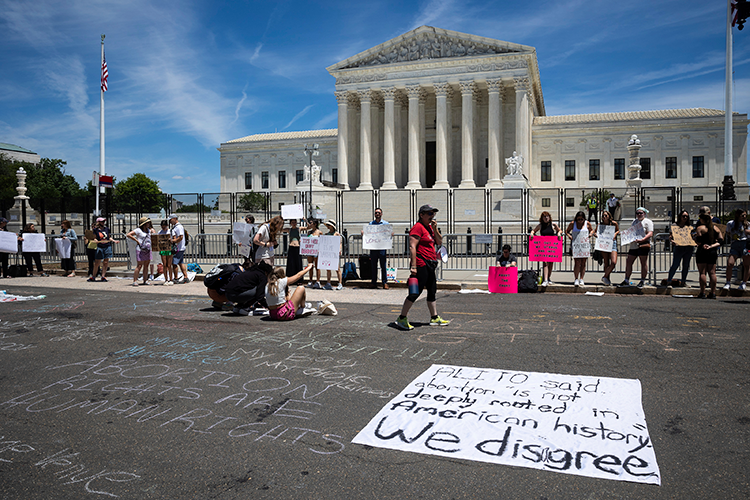Does 13th Amendment protect a right to abortion? Federal judge orders briefing on the scope of Dobbs

Abortion-rights advocates protest outside the U.S. Supreme Court in June 2022 after the Dobbs decision. Photo by Francis Chung/E&E News/Politico via the Associated Press.
A federal judge in Washington, D.C., has asked for briefing on whether the 13th Amendment’s ban on slavery and involuntary servitude—or some other constitutional provision—protects a right to abortion.
U.S. District Judge Colleen Kollar-Kotelly of the District of Columbia asked for the briefing in a criminal case against 10 protesters charged with conspiring to block access to an abortion clinic in 2020, report Politico and MSNBC via How Appealing.
They were charged under a law that makes it a crime to conspire to intimidate people “in the free exercise or enjoyment of any right or privilege secured to him by the Constitution or laws of the United States,” according to Vox.
Kollar-Kotelly ordered the briefing Monday, after one of the defendants argued that the charges must be dismissed because the Constitution doesn’t confer a right to abortion. The defendant cited the U.S. Supreme Court’s June 2022 decision in Dobbs v. Jackson Women’s Health Organization, which overruled the abortion-rights opinions Roe v. Wade and Planned Parenthood v. Casey.
Kollar-Kotelly said the defendants were charged under a statute that regulates abortion and a broader range of reproductive health services, including counseling and referral. But she said she would order briefing since the defendants are citing a constitutional argument.
Justice Samuel Alito wrote the majority opinion in Dobbs.
“The Constitution makes no reference to abortion, and no such right is implicitly protected by any constitutional provision, including the one on which the defenders of Roe and Casey now chiefly rely—the due process clause of the 14th Amendment,” Alito wrote.
Despite Alito’s pronouncement, Kollar-Kotelly said she is uncertain whether the decision extends beyond the 14th Amendment, since that was the issue before the court.
“It is entirely possible that the court might have held in Dobbs that some other provision of the Constitution provided a right to access reproductive services had that issue been raised,” Kollar-Kotelly wrote.
Kollar-Kotelly said the briefs should address whether the scope of Dobbs is confined to the 14th Amendment and, if so, whether any other constitutional provision could confer a right to abortion.
One possibility is the 13th Amendment, which “might contain some right to access to [reproductive] services,” Kollar-Kotelly wrote. She noted a 1990 law-review article and a 1995 federal appeals decision that discussed the issue.
The author of the law review article, Andrew Koppelman, a professor at the Northwestern University Pritzker School of Law, made his case in a January 2022 op-ed for the Hill. He argued that compulsory pregnancy was one of the abuses of slavery, and the 13th Amendment banned it when it banned slavery.
The Volokh Conspiracy noted Kollar-Kotelly’s order in a post by Josh Blackman, a professor at the South Texas College of Law in Houston.
“This is the sort of move that an eager law clerk cooks up, but a judge is supposed to veto,” Blackman wrote.
Vox acknowledged that the 13th Amendment argument is unlikely to persuade any justices in the Dobbs majority. But the author blamed the Supreme Court for an environment that encourages “judicial entrepreneurship,” particularly by conservative judges.
“If this Supreme Court didn’t want lower court judges to act like partisan trolls, it could communicate that to those judges by hewing more closely to legal texts and to existing precedents,” Vox argued.



